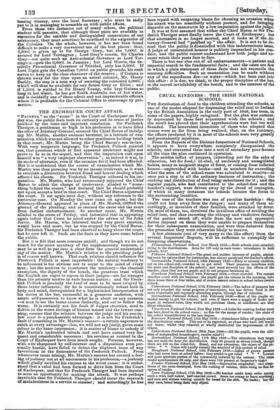THE EXCHEQUER COURT AFFAIR.
it PAINFUL" as the "scene" in the Court of Exchequer on Fri- day was, the public feels both its curiosity and its sense of justice baulked by the lame and impotent conclusion. Sir Frederick Thesiger, a gentleman so high in his profession as to have filled the office of Attorney-General, accused the Chief Baron of indulg- ing Mr. Martin, another eminent barrister, in a latitude of exa- mination which was not allowed to other gentlemen bolding briefs in that court ; Mr. Martin being the Chief Baron's son-in-law. With very temperate language, Sir Frederick Pollock pointed out, that questions which at first appeared irrelevant might not prove to be so in the sequel, and that the imputation cast upon himself was "a very improper observation" ; as indeed it was, in its mode of utterance, even if the occasion for it had been afforded. But it is understood that the course of examination which Mr. Martin was then pursuing was by no means irrelevant, as it went to establish a distinction between fraud and honest dealing which affected his clients. Sir Frederick Thesiger adhered to his im- putation. Mr. Martin, who had erroneously supposed the Chief Baron to admit the charge of irrelevancy, alluded to "some- thing behind the scenes," and declared that he should probably not again accept a brief in that court. The Chief Baron adjourned the court. It sat again next day, without any reference to the particular case. On Monday the case came on again but the Attorney-General appeared in place of Mr. Martin, shifted the ground of the pleading, and so rescued the cause and the court from further embarrassment. In another cause, Mr. Martin alluded to the scene of Friday, and intimated that in appearing again before that Court he acted under the advice of Sir John Jervis. Mr. Martin, who laboured under very great emotion, would have said more, but he was stopped by the Chief Baron. Sir Frederick Thesiger had been observed to hang about the court, but he now left it. Such are the facts as they have come before the public.
But it is felt that more remains untold ; and though we do not vouch for the strict accuracy of the supplementary rumours, it may be as well to put into a clear form the general understand- ing of the matter. Mr. Martin's relation to the presiding judge is of course well known. That such relation should influence Sir Frederick Pollock is most improbable : the natural tendency to be influenced is too obvious not to occur to the mind of every man ; but the motives to counteract the tendency—the classical exemplars, the dignity of the bench, the generous trust which the English are eager to repose in their judges—are far stronger than the primary motive in rude human nature ; and Sir Frede- rick Pollock is precisely the kind of man to be most swayed by those better influences ; for he is constitutionally robust both in body and mind, distinguished for a higliminded interpretation of his duties at the bar, successful in a generous ambition, with ample self-possession to know what he is about on any occasion —a man to see the better course distinctly, and not to follow the worse. It is certainly not his fault if vulgar attornies, used to dabble in the worst feelings of human nature and the lowest cun- ning, assume that the relation between the judge and his son-in- law mast be a purchaseable advantage : it is not Sir Frederick's fault if something in Mr. Martin's manner—a certain eagerness to catch at every advantage—has, we will not say justly, given some colour to the baser impression ; it is matter of blame to nobody if Mr. Martin's undoubted talents and zeal have earned very fre- quent and considerable successes : his services as counsel in the Court of Exchequer have been much sought. Persons, however, with wits sharpened by self-interest and a disposition even per- sonally hostile, have failed to detect the slightest trace of any favouritism in the demeanour of Sir Frederick Pollock. From whatsoever cause arising, Mr. Martin's success has created a feel- ing ofjealousy not at all uncommon in his profession,—a jealousy Which gladly ascribed his success to the worst cause : it is under- stood that a cabal had been formed to drive him from the Court of Exchequer, and that Sir Frederick Thesiger had been deputed to seize an opportunity for making the attack. It was perhaps inevitable that Sir Frederick Thesiger should incur the reproach Of maladroitness in a service so sinister ; and accordingly he has
been repaid with unsparing blame for choosing an occasion when his attack was too manifestly without pretext, and for bringing discredit on the manceuvre by a low imputation against the judge.
It was at first assumed that either the Chief Baron or Sir Fre. derick Thesiger must finally leave the Court of Exchequer; but that alternative is no longer mooted, and it looks as if the At- torney-General had "patched up" the affair. It is not to be de- nied that the public is dissatisfied with this indeterminate issue. A judge of untarnished honour is publicly impeached in his con- duct, and the public cannot understand how both judge and ac- cuser retain their posts face to face. There is but one clue out of all embarrassments—a patient and impartial search to the fundamental facts ; and the cases are few in which a plain statement of those facts does not reconcile the seeming difficulties. Such an enunciation can be made without any of the superfluous fire—or water—which has been cast into this affair : it is due, we think, to the proper discipline of the bar, to the sacred inviolability of the bench, and to the interest of the public.


























 Previous page
Previous page